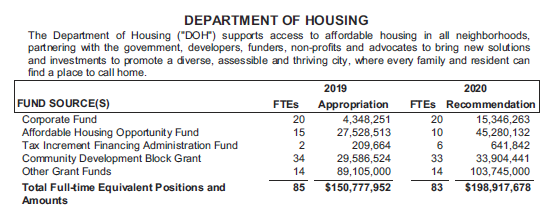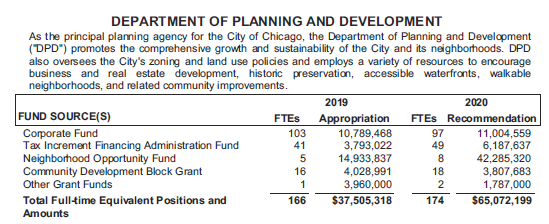How does Mayor Lightfoot’s 2020 Budget stack up to MPC’s recommendations for a more equitable, sustainable, and prosperous Chicago?

Wisconsin Technical Colleges, https://tinyurl.com/wvxg9yt
 By Josh Ellis and Justin Williams and Paola Villegas
By Josh Ellis and Justin Williams and Paola Villegas - December 3, 2019
So what happens when a Mayor who ran on a progressive policy platform inherits a larger-than-anticipated budget shortfall? The City of Chicago’s 2020 budget gives us one answer.
Balancing the 2020 City of Chicago budget challenged Mayor Lightfoot to close an $838 million budget gap without relying on big property tax hikes. Attempts to secure authorization in Springfield for a graduated Real Estate Transfer Tax didn’t go as planned, and the jury is still out on $163 million in emergency services reimbursements.
Budgets are a reflection of priorities, so although the new year is just dawning on the fiscal year 2020 City budget, it’s an opportune time to ask: what does the Mayor’s inaugural budget tells us about her priorities? To answer that question, we went back and looked at MPC’s list of policy recommendations submitted to Mayoral Candidate Lightfoot way back in March 2019. How did she prioritize those initiatives? And where is more progress needed?
Note, we don’t delve too much into the revenue, financing or debt side of things here. Our colleagues at the Civic Federation provide great detail on those. Rather, we focus on what the expenditure side tells us about what matters to Mayor Lightfoot and her administration.
Build a More Affordable Chicago
The City is facing a 120,000 unit shortfall in affordable housing. The Chicago Department of Housing (overseen by MPC’s former VP Marisa Novara) is charged with ensuring the City’s housing needs are met.
To close that gap, the Department of Housing is going to need substantial financial resources to build new affordable units and preserve existing affordability. In our Mayoral Briefing Book, we urged the new Mayor to commit $32.3 million in corporate funds (the City’s general operating revenue) to the Department of Housing. Although the 2020 budget didn’t get there, there was a significant increase in funding.

City of Chicago 2020 Budget Overview, p. 141
Two things are interesting here. First, there’s an increased commitment from corporate funds for affordable housing: from $4.3 million in 2019 to $15.3 million in 2020. $5 million of the increase will go to the city’s Low-Income Housing Trust Fund, a critical source of financial assistance to residents making less than 30 percent of area median income to construct 520 additional affordable housing units. Another $5 million will be put into the Flexible Housing Pool, an initiative that provides necessary housing and supportive services to individuals experiencing homelessness. This boost will house more than 200 youth.
Second, there’s a substantial increase (from $27.5 million in 2019 to $45.3 million in 2020) in funding from the Affordable Housing Opportunity Fund –the fund that developers can pay into instead of building affordable units onsite per the Affordable Requirements Ordinance.
The big drawback to relying on the Affordable Housing Opportunity Fund is that it might dry up. Because the Fund is maintained by in-lieu payments, if the new housing construction market cools off, or if the Affordable Requirements Ordinance is substantially revised as a result of the recently convened task force (co-chaired by MPC Manager Juan Sebastian Arias!), there may be less available for the Department of Housing. Corporate funding is a better, more stable long-term funding source for ensuring affordable housing.
Although the corporate funding level is still less than half what it was when the Department of Housing was last fully staffed in 2009, the City still tripled its general fund commitment to the Department of Housing in 2020 as compared to 2019. That’s a step in the right direction, especially in the context of an $838 million citywide budget shortfall where many departments saw only nominal increases in corporate funding.
Start Tackling Water Supply Issues
Chicago has two major water supply issues that demand attention: lead in drinking water and drinking water affordability. Although there’s no direct statement in the budget of a lead service line replacement plan, there is some hint of a plan in the Department of Water Management’s budget:

City of Chicago 2020 Budget Overview, p. 88
Chicago has more lead service lines than any other American city, and one of MPC’s major priorities is the removal of that health risk. Notice the big increase in funding to the Commissioner’s Office? Most of that is an anticipated $5 million Community Development Block Grant, federal funds that could be used to replace lead service lines.
At the Department of Water Management budget hearing, Commissioner Randy Conner was asked what that $5 million grant was going to be used for. The answer - for “possible repair or replacement of water service lines in low to moderate income neighborhoods” (p. 18) doesn’t exclude lead service line replacement, but it also doesn’t necessarily include it.
In any case, if it is for lead service line replacement, it would represent progress on tackling lead in drinking water. We’d applaud that. But a $5 million pilot needs to be part of a much larger effort to replace lead pipes in Chicago and Illinois.
On water affordability, there’s some good news: the creation of a Utility Billing Relief Program to assist eligible homeowners pay for water and other utilities. The program shows promise in reducing barriers to accessing water, a basic human right. For more, see what MPC’s Director of Water Resources, Danielle Gallet, had to say in her recent blog post.
Address Transportation Infrastructure
Transportation is another area where the budget prompts multiple questions. The Chicago Department of Transportation will see modest staffing cuts across divisions, despite projected revenue gains from the State motor fuel tax increase ($43.7 million). The budget also proposes a hiring freeze affecting 150-200 positons for cost-savings purposes. That raises questions about how the Department of Transportation will support Vision Zero, Equitable Transit Oriented Development, and more.
On the plus side, the Mayor’s recent amendments to the Ground Transportation Tax are projected to reduce congestion downtown and create $40 million in new revenues. Most notably under the revised tax, single-occupant rides beginning or ending in the downtown area will have a $3-per-ride fee assessed. Analysis by the Center for Neighborhood Technology shows that the new fee structure will overwhelmingly impact affluent, single occupancy riders. See MPC Director of Transportation Audrey Wennink’s blog post on why we support this tax as a way to incentivize better transportation decisions.
Build Neighborhood Opportunity by Leveraging Downtown Development
The City of Chicago needs to make sure that the gains from downtown economic development are distributed equitably, across neighborhoods. There’s evidence the Mayor is committing resources to that effort.

City of Chicago Budget Overview, p. 146
The Chicago Department of Planning and Development will see substantial increases in funding in 2020, overwhelmingly attributable to a $42.3 million appropriation from the Neighborhood Opportunity Fund.
The Neighborhood Opportunity Fund, like its Affordable Housing counterpart, leverages private development to support broader policy aims – in this case, economic development in disinvested South and West side neighborhoods. The budget doesn’t provide details about how that money will be used, but we know that Mayor Lightfoot has announced an economic investment program called “Invest South/West,” which seeks to leverage $30 million in Neighborhood Opportunity Fund money (and other resources) to attract additional investment in 10 Chicago neighborhoods.
Partner Closely with Communities on Comprehensive Planning
Participatory, comprehensive planning is a critical step toward equitable growth, population growth, smarter investments, and fewer unintended consequences . Comprehensive planning – at both the design and implementation stages –is going to require a serious commitment to staff up at the Department. of Planning and Development. Maurice Cox, the new Commissioner who hired 36 new planners when he was Detroit’s planning chief, testified that Chicago’s Department of Planning and Development will increase its number of planners on staff from 20 to 28, and the budget line items bear that out. That’s a good start toward building the capacity needed to help local leaders realize their visions for each neighborhood’s future.
Stop Inequitable Fines, Fees, and Ticketing
Consistent with MPC Cost of Segregation findings and Our Equitable Future recommendations, the Lightfoot administration is taking steps to wean the City from its addiction to fines and fees. In September 2019, the Chicago City Council approved a reform to stop the suspension of driver’s licenses for nonpayment of parking tickets, which disproportionally penalizes poor and working class people of color. The Mayor’s budget reflects a modest, reduced reliance on fines, forfeitures, and fees to generate revenue (from $345 million in 2019 to $342.7 million in 2020).
Start Preparing Chicago for Climate Change
Introduced in February 2019 as the Emmanuel administration was winding down, the Resilient Chicago plan for inclusive growth and a connected city offers many promising ideas poised for implementation. Support from the Mayor’s office could include hiring a Chief Resilience Officer tasked with working with multiple city departments to move the plan forward.
An encouraging note: the Mayor’s Budget Overview pledges support to an Office of Environment and Sustainability housed within the Office of the Mayor (see p. 61). This could serve as a stepping stone toward the ultimate re-establishment of a Department of Environment, but in the interim is more likely to be a newly hired Chief Sustainability officer with responsibilities to craft a new environmental agenda for the City. One suggestion of the Environment Transition Committee (which MPC Vice President Josh Ellis served on) was to create an external Environmental Advisory Board, which could add some capacity and thought leadership to support that new hire and development of a long-term strategy.
Conclusion
When compared to MPC’s Mayoral Briefing Book recommendations, the Fiscal Year 2020 City of Chicago budget will execute important reforms and get the ball rolling on key initiatives. There are also multiple priorities where we’re looking for leadership: on equitable transit-oriented development, riverfront revitalization, bike and walk infrastructure, and sustainable stormwater management solutions. And there is a need for coordinated strategies to ease homelessness, to support neighborhood business growth and more. But let’s celebrate a lot of progress on some important issues, especially in the context of a major budget shortfall and a new administration that took office just six months ago and is still in formation. We’re hopeful that this budget signals the Mayor’s dedication to implementing the transparent, equitable policy platform she ran on – and that with more time and resources, Chicago can deliver on its potential to grow equitably, achieve financial stability, and leave no resident behind.